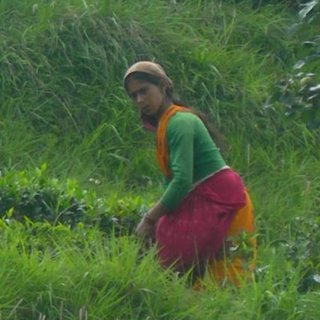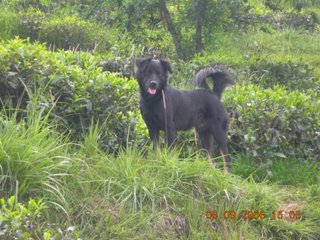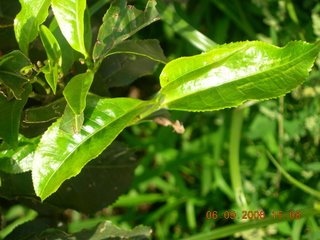a school girl marvelling at the animals "behind the bars",;P... only now the school girl was inside a
near-sterilized(we had to take off our shoes, wash ourselves before entering :P) environment, concentrating hard on the highly technical words our barely educated escort was using to describe the tea-manufacturing process.
Frankly, it was quite a blow to my post graduate, glib s/w professional ego, when I could not even recognize, let alone understand, half the words he used, :P and no he was pronouncing and using them correctly, as I later confirmed from the tea estate manager (I wasn't going to give up that easily ;) ) ....
 Back to my field trip, we were first shown the tea garden itself, where people were collecting tea leaves,
Back to my field trip, we were first shown the tea garden itself, where people were collecting tea leaves,with the "movie style" baskets hanging over their heads. Deftly sorting out only the healthy, fully grown
leaves and dropping them in the baskets, these workers collect as much as 2000 Kg of tea per season (2-3 months) from a single garden. Ofcourse, the weight would depend on the number of workers and the size of the garden,but we would leave so many dynamic variables for my article on theory-of-relativity...I will write it someday :P
 The gardens were not guarded by people, but highly trained dogs, who were so good at their job, that sitting atleast 20 feet away, he started growling the moment we bent down on the plant( picking leaves, quite obvioudly,was not allowed), and sat back the moment we stood up...
The gardens were not guarded by people, but highly trained dogs, who were so good at their job, that sitting atleast 20 feet away, he started growling the moment we bent down on the plant( picking leaves, quite obvioudly,was not allowed), and sat back the moment we stood up...These leaves are then taken to the factory, and so were we, where they go through the process of becoming what we drink...
The moment we entered the factory premises, a very distinct smell engulfed us, of fresh tea leaves, mixed with wet soil...sort of the leaves had been spread out on open sheets to dry up, shaded very carefully to avoid direct heat from the sun.
This is called weathering.
They're then spread out on a big roller belt sort of a machine which performs a sort of seiving of the leaves from accidental twigs etc.
 They're then segregated into various varieties depending on the size, color of the leave, since these
They're then segregated into various varieties depending on the size, color of the leave, since thesetwo are the most important indicators of the ripeness & taste of the would-be-tea. this step is called
grading and is done majorly manually with very little help from machines. And yes this is done in a restricted area,a truly sterilized environment, where we could only peek into through the glass erected specially for such tours as ours, I presume.
Beyond the above three steps, having long been stripped of my camera and cellphone, and not provided with a notebook & a pen in return, my memory refused to remember anymore of the complicated machinery, names and mechanisms. :P
After the grading part, all machines only grew in size, and each turned the fresh, damp, green leaves to a smaller, drier, powdered form, and it became more recognisable and less beautiful...
In the end, the escort showed us various varieties, ranging from Rs.250/Kg to Rs.2550/Kg ...!!!
Frankly I never knew making tea was so technical, and drinking it could be so expensive....
But then, I also never knew, that my word power was so restricted to s/w ...:P
All in all, it was fun....just like schooltime, and I am hoping I can do this again some time soon,
my next target,ummmm...I dont know, may be paper-manufacturing ... ;)
No comments:
Post a Comment